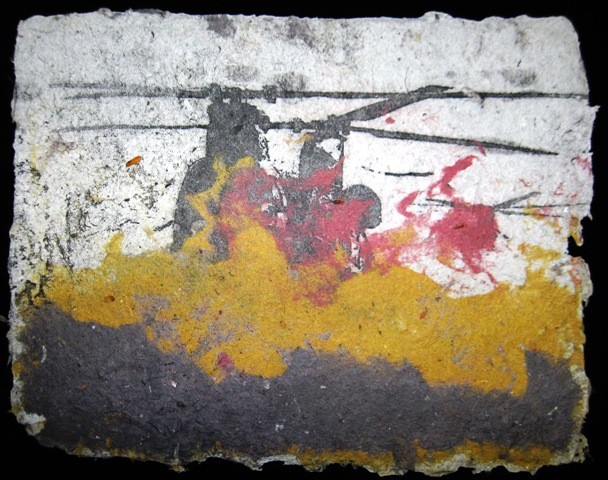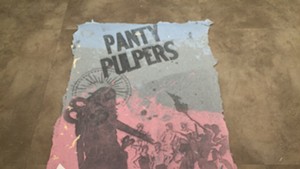
- Courtesy of the Hopkins Center for the Arts, Dartmouth College
- "Deployed" by Drew Matott
“Rags make paper,” Cameron explained earlier this week in a phone call from his San Francisco home. “It’s the traditional craft, the old way of making paper.”
That initial impulse might sound almost utilitarian, but turning his combat uniform into paper pulp — and, later, into a work of art — had a profound affect on the artist. “It was extremely empowering,” Cameron remembered. “It was this feeling of having agency over my own story, [and being] able to develop a language to interpret and share reflections on the military experience.”
Cameron leads free and open-to-the-public paper-making workshops in Room 60A at Dartmouth's Hopkins Center for the Arts on Saturday, January 24, and Sunday, January 25, from noon to 5 p.m. On Monday, Cameron gives a talk titled "Artists Respond to War, Part 1," in Room 219 of the college's Wilson Hall. Civilians and veterans alike are invited to join; workshops are run on a drop-in basis, and participants can come and go as they please.
Cameron now frequently travels around the country for such projects, teaching paper making and giving talks. The process of the craft, he pointed out, is inherently cathartic: Combat uniforms are beaten to a pulp to make paper.
“It is literally transformative,” Cameron said. “You’re transforming the physical state of the textile into paper, and we can use that as a lens to look at other things that are occurring. Paper also has the longstanding state of being a place to record information.
“This material, its physical form changed, has a relationship to a personal story and a social story,” he continued. “And we can use that as a starting point to investigate further. So it’s a little transformation and also perfectly fitting as a means to convey further ideas.”
The results of that creative process are often visually evocative. In a 2009 story about a Combat Paper Project exhibit in the Firehouse Gallery (now BCA Center) in Burlington, Seven Days reviewer Kevin J. Kelley noted the "raw, ritualistic quality" of the works.
Cameron was an artist before he was a soldier. A New Hampshire native raised in Iowa, he first learned traditional paper-making techniques from his father, a retired air force officer. But Cameron's early adult life initially took him away from the craft: Right out of high school, he enlisted in the U.S. Army, and served from 2000 to 2006. That period included four years of active duty in Iraq as an artillery field soldier, and two years in the Vermont National Guard.
In 2004, while pursuing a degree at the University of Vermont, Cameron found his passion for paper making rekindled under the guidance of Drew Matott, a paper artist working out of Green Door Studio. Cameron became managing director of the studio in 2006, the year that he hit upon the idea of making pulp from former combat uniforms.
"There is a longstanding tradition of having an artistic response to military conflict, both by those who have survived it and those who have participated it," he said. "We’re continuing to stand on the shoulders of those who have come before us."
Speaking of...
-

Vergennes Memorial Day Parade Draws a Patriotic Crowd
May 29, 2023 -

Video: Old East End Neighbors Volunteer at Greenmount Cemetery
Aug 12, 2021 -

VA Hospital Adding ICU Beds After Two Vets Test Positive
Mar 18, 2020 -

Grunts Move Junk Offers Vets a Moving Occupation
Mar 17, 2020 -

Show and Tell: The 2019-20 Performing Arts Preview
Sep 11, 2019 - More »







Comments
Comments are closed.
From 2014-2020, Seven Days allowed readers to comment on all stories posted on our website. While we've appreciated the suggestions and insights, right now Seven Days is prioritizing our core mission — producing high-quality, responsible local journalism — over moderating online debates between readers.
To criticize, correct or praise our reporting, please send us a letter to the editor or send us a tip. We’ll check it out and report the results.
Online comments may return when we have better tech tools for managing them. Thanks for reading.